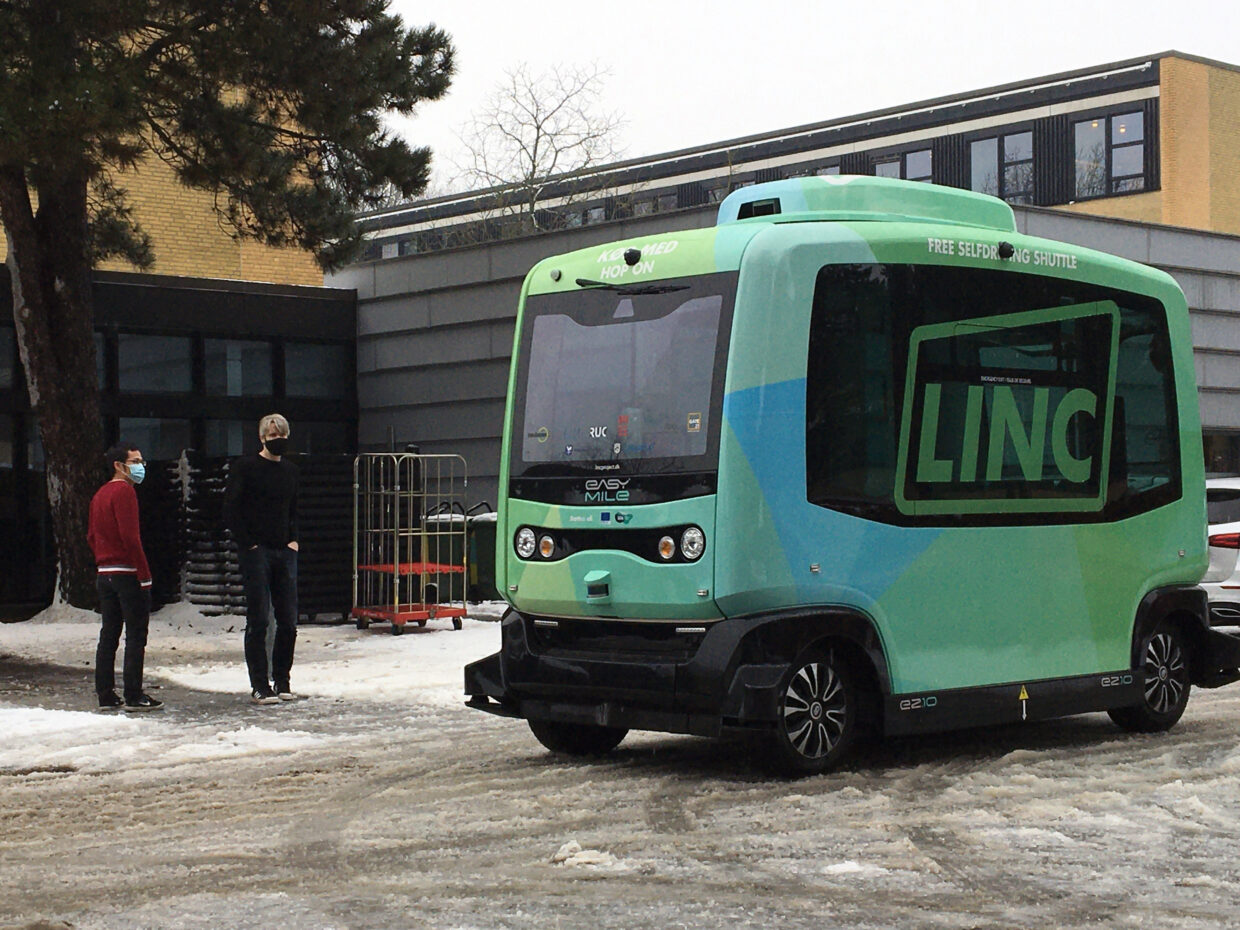
Self-driving shuttles approved for test-drives on Technical University of Denmark
Scroll ned for at læse mere

Scroll ned for at læse mere
The Danish Minister of Transport has now signed the approval for the LINC project, which will test self-driving shuttles at DTU Campus Lyngby. Students and staff can try out the shuttles from April 2021.
A long-awaited approval from the Danish Road Directorate has just landed in the mailbox of the project group behind the self-driving LINC shuttles that will run on DTU Lyngby Campus. Nobina, which is responsible for the operation of the self-driving shuttles and has prepared the application to the Danish Road Directorate, welcomes the approval:
“It is great to have the approval and now we can make the very last preparations before welcoming passengers aboard the self-driving shuttles. We need to map the route for the three shuttles so that they can find their way. Once this has been done, our external security advisor must approve the final test set-up. This is the first time an Easymile shuttle will be in operation in Denmark, so it will be exciting when we can get going with the first test passengers in April,” says Rasmus Noes, Head of Market and Business Development at Nobina Denmark.
To ride the self-driving shuttles on DTU Campus Lyngby, you must sign up as a test passenger. Sign up as a test passenger here.
To get DTU Campus Lyngby ready for the three LINC shuttles, the project group behind LINC has already been working for some time to prepare the infrastructure along the route.
“We have set up location signs on Asmussens Allé, which will help the shuttle find its way, as there are few fixed points on that part of the route. In addition, we are in the process of setting up the signs for the six bus stops and we have coordinated the route and test period for the three shuttles so that it does not coincide with road works in relation to the remodelling of DTU,” says operations manager at DTU Campus, Anders B. Møller.
Due to the Coronavirus, it has been quiet on campus and therefore easier to make the necessary infrastructural changes. However, the quiet campus is also a challenge for the LINC project, as the project researchers need to study the behavior of test passengers in and around the shuttle.
“Riding with the self-driving shuttles at DTU also means participating in the researchers’ user surveys on how passengers experience the self-driving shuttles. The studies are, of course, challenged by the fact that most students are currently being taught virtually. That’s why we’re addressing students and staff right now who are still on campus occasionally and urging them to become test passengers. In time, we hope that the Corona restrictions will be eased so that we can get more test passengers in our LINC shuttles,” says Kenneth Jørgensen, project manager for LINC in the partnership organization Gate 21.
“As some of the researchers’ studies look at passengers’ preferences for transport even before the test, it is important that test passengers sign up now.”
When the self-driving shuttles start running at DTU Campus Lyngby in April, they will adhere to the current Corona restrictions on public transport. This means that passengers must wear masks and that there can only be a limited number of people in the shuttle at one time, according to the distancing requirements.
Do you occasionally visit DTU Campus Lyngby? Maybe you are a student, employee or guest – or maybe you live in student accommodation? Then become a test passenger in the three self-driving shuttles that will run in the southern part of the campus from April 2021 until the summer holidays.
LINC is one of the largest projects for self-driving shuttles in Denmark. LINC tests shuttles in a natural urban environment with daily passengers. The aim is to develop public transport so that it is an attractive and green choice for citizens in the future.
Through the test at DTU, researchers collect data about the operation of self-driving shuttles and how passengers experience them. LINC wants to develop the self-driving shuttles so that in the future they can provide citizens with an intelligent service that comes when you call and can fill the “last mile” gap between the station and the workplace or home.
Albertslund Municipality, Gladsaxe Municipality, Nobina Danmark A/S, IBM Danmark ApS, the Technical University of Denmark, Roskilde University and Gate 21.
The project is funded by the partners and the EU program Urban Innovative Actions (UIA), which supports the project with 25 million DKK.